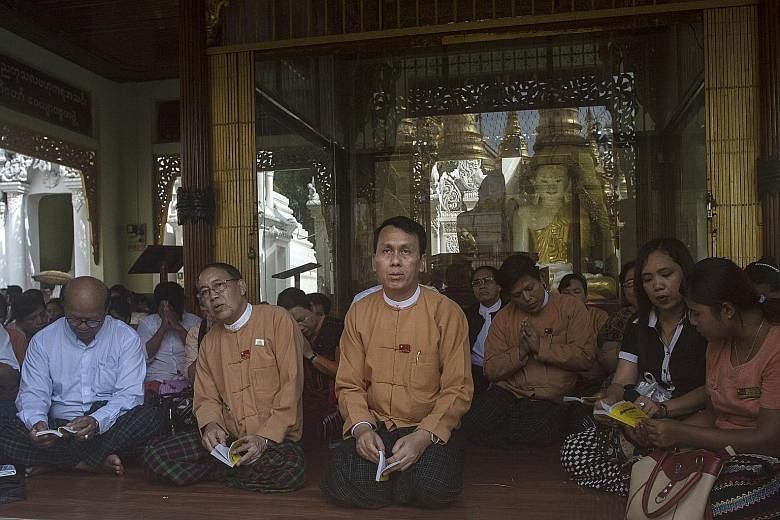In Myanmar's personality-driven politics, few people get as much attention as its civilian leader Aung San Suu Kyi or its powerful commander-in-chief Min Aung Hlaing.
Yangon's Chief Minister Phyo Min Thein is another person who has hardly stayed out of the public eye since the National League for Democracy (NLD) came to power last year.
He lit a candle to open a mass interfaith prayer earlier this month, calling for international understanding amid condemnation over the violent ejection of Rohingya Muslims from Myanmar's Rakhine state. He boarded a brand new ferry on Yangon River to launch a water bus service that aims to ease the traffic gridlock in Myanmar's financial capital.
He has drawn fire from the military, but has also clashed with media outlets which question his hurried, opaque administrative style, which has drawn unflattering comparisons to crony capitalism that marked life under military rule.
Yet, he told The Straits Times that he has nothing against the media, and instead, pins the blame on a shallow understanding of Myanmar's realities. The NLD government is dealing with pent-up demand unleashed by the transition from five decades of military rule, he said.
"They want many things," he explained in an interview at his office last month. "We work fast because people, who didn't have the chance to speak out before, are pushing... We are trying our best."
At 48, he is the youngest member of the ruling party's central executive committee, handpicked by Ms Suu Kyi for the Yangon post after joining the NLD only in 2012.
The former student leader was put behind bars for 15 years for taking part in an uprising against the junta in 1988. He never got to finish his degree at the University of Yangon, where he was majoring in physics. He founded his own party after imprisonment, before joining the NLD.
But the rising star, described by one NLD colleague as "very sharp" and politically adroit, stirred controversy early in his term when he sued the Eleven Media Group over an article that alleged corruption, using a controversial law wielded by the military against its critics. The media group later issued a public apology.
When Reuters news agency ran an article questioning the procurement of buses from China without a tender, he complained to the nation's press council that he was wrongly accused of improper conduct. Reuters has stood by its story.
Cutting an earnest figure, he said: "I want to protect media freedom. The media is important to our country's development."
Myanmar has come a long way over the past 30 years, he said. "Throughout these changes, we got a lot of help from the media. I would like to continue that collaboration."
The press is welcome to criticise the government's performance as long as it gets the facts right, he said.
Yangon overhauled its bus services by streamlining many private bus lines into a system served by a public-private partnership. He said the government acted as a regulator and facilitator in the whole process. "The government should not order private companies to take certain decisions… The companies are operating with their own directors and boards," he stressed.
Myanmar's democratic transition is still very nascent, he said.
"We don't have a complete democracy. We are just starting out and the process is very delicate. We have many challenges - in peace, democracy, human rights, rule of law and development of (economic) sectors," he added.
Myanmar's Constitution grants the men in green control over key security-related ministries as well as many civil service positions. This means Mr Min Aung Hlaing has powers that are not typical of civilian-led administrations.
"We are trying our best to have good relations with the military and to collaborate for the future," Mr Phyo Min Thein said. "To reach the goal of democracy, we will move slowly and steadily."
This caution also means backtracking when some unspoken boundaries are crossed, like he did in July after he said that a military chief's rank is similar to that of a director-general in a typical democracy. The military demanded an apology, which he duly gave. Asked about this, he declined comment.
He was more effusive, though, when asked about the common lament that the NLD was overly reliant on Ms Suu Kyi for direction and did not appear to have a younger generation of leaders able to see Myanmar's reforms through.
Each generation produces its own leaders, he said. Just as Myanmar's pro-independence struggle threw up its founding father Aung San, its democratic struggle produced Ms Suu Kyi, his daughter. The NLD's Parliament speakers and ministers are well qualified, he added.
"Daw Aung San Suu Kyi will build the new generation of leaders," he said confidently. "In a democracy, the people and the party members should pick leaders. We can't fix the leader beforehand - that only takes place in dictatorships."

